
Eysenhardtia orthocarpa
Kidneywood
Kidneywood can be grown as a shrub or small tree. Works well as a screen in a naturalistic setting. Canopy coverage: 79 square feet.
[Read More]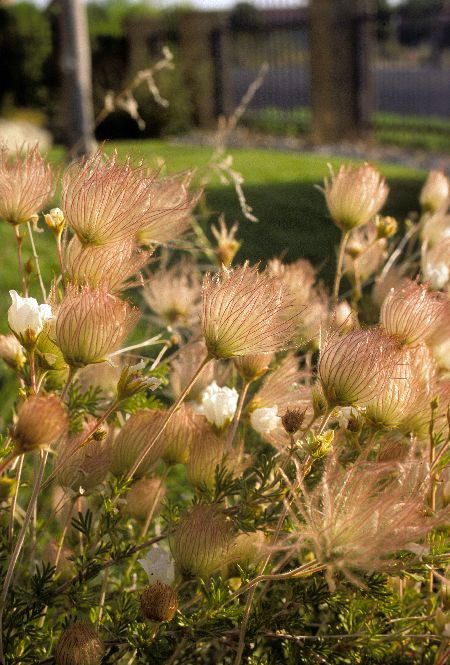
Fallugia paradoxa
Apache Plume
The showy seedheads of Apache Plume are more eye-catching than the small, roselike flowers. Seedheads are pinkish puffballs that light up in the sun. Form is irregular but still suitable as background or screen. Plants can be semievergreen. Canopy coverage: 13 square feet.
[Read More]Ficus carica
Fig Tree
Fig plants can be maintained at about any size and even work well as shrubby trees. If damaged by cold, they often regrow to take on a shrub form. Check locally for varieties best-suited to your region. Canopy coverage: 314 square feet.
[Read More]Forestiera neomexicana
Desert Olive
Train Desert Olive as a small tree or shrub. Appealing features include the light gray bark, which contrasts nicely with its bright green leaves. Attractive yellow fall color. Canopy coverage: 50 square feet.
[Read More]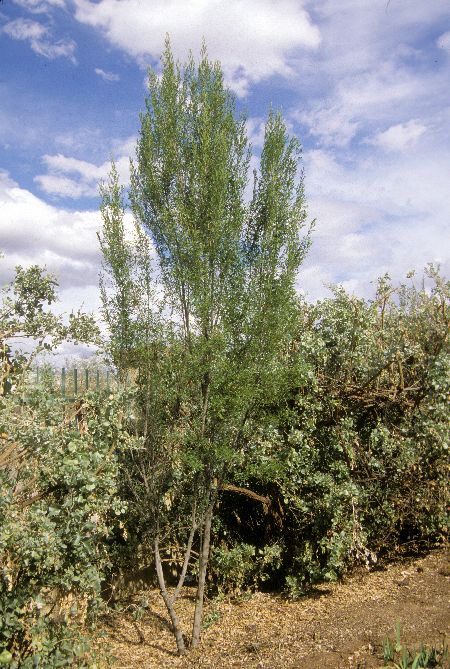
Fraxinus greggii
Littleleaf Ash
Littleleaf Ash can be grown as a small tree or shrub. Graceful rounded form. Canopy coverage: 50 square feet.
[Read More]
Guaiacum coulteri
Guayacan
Find a warm microclimate for this interesting shrub, then enjoy the vibrant, blue-violet flowers, brilliant in contrast with the twisted, deep green branches. Extra summer water will pay dividends with more flowers. Canopy coverage: 20 square feet.
[Read More]
Hamelia patens
Scarlet Bush, Fire Bush
A good choice for a subtropical effect, with lush foliage and clusters of tubular flowers. It is cold-tender, so plant in a sheltered location if freezing temperatures are common in your region. Canopy coverage: 20 square feet.
[Read More]Hibiscus moscheutos
Rose Mallow
Rose Mallow is a shrubby perennial that can reach up to a towering 8 feet high. However, most hybrids fall into the 4-foot-high range. Very large flowers up to 12 inches across in a range of bright colors is a primary attraction. Dies to the ground in winter. Canopy coverage: 13 square feet.
[Read More]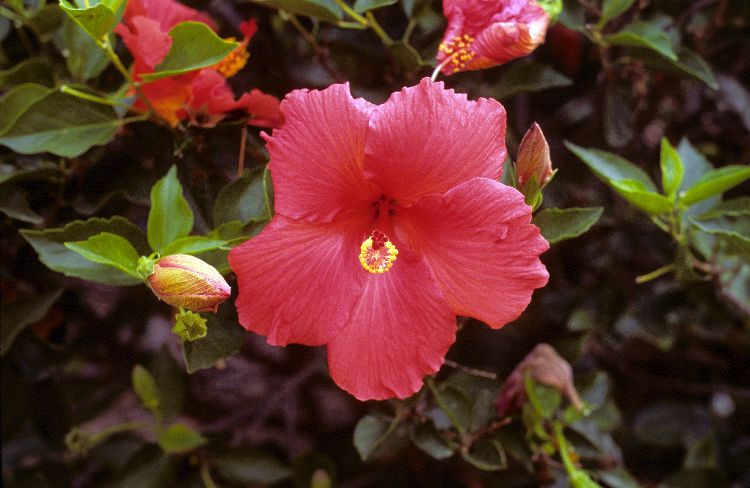
Hibiscus rosa-sinensis
Hibiscus
Tropical flowers and foliage are the attractions of Hibiscus. Protect against frost and wind. In hot-summer areas, avoid planting in locations exposed to long periods of afternoon sun. Canopy coverage: 50 square feet.
[Read More]Hibiscus syriacus
Rose of Sharon
When in bloom, Rose of Sharon reminds one of hollyhocks. It can be pruned to suit the needs of the landscape, from small tree to large, natural shrub or screen. Flowers are mostly shades of pink. Leaves have a coarse texture. Best with some protection from the sun in hot summer regions. Canopy coverage: 28 square feet.
[Read More]Juniperus chinensis 'Sea Green'
Sea Green Juniper
You will notice this shrub Juniper in the landscape due to its fountainlike form. In addition to being an attractive specimen plant, it makes an admirable hedge or medium-sized screen. Best with some protection from the sun in hot summer regions. Canopy coverage: 28 square feet.
[Read More]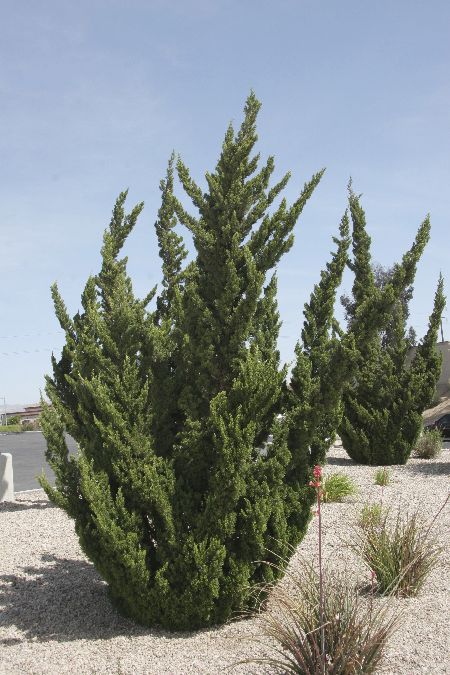
Juniperus chinensis 'Torulosa'
Juniper
Junipers are available in an extremely wide range of sizes, forms and foliage colors. They are easy-care, versatile plants once established. Avoid the temptation to prune or shape them—allow plant to maintain its natural form. Popular shrub types include 'Torulosa' and 'Pfitzerana'. Canopy coverage: 79 square feet.
[Read More]Juniperus osteosperma
Utah Juniper
Utah juniper can be trained as a tree or large shrub. Despite its common name, it is the most common juniper in Arizona. Accepts dry rocky soils. Canopy coverage: 314 square feet.
[Read More]Juniperus sabina 'Buffalo'
Buffalo Juniper
Buffalo Juniper has appealing, bright green to olive green foliage. Leaves grow on long stems that spread horizontally close to the ground, forming a tight-knit mat. Accepts tough conditions. Attractive when it drapes and trails over ledges. Canopy coverage: 50 square feet.
[Read More]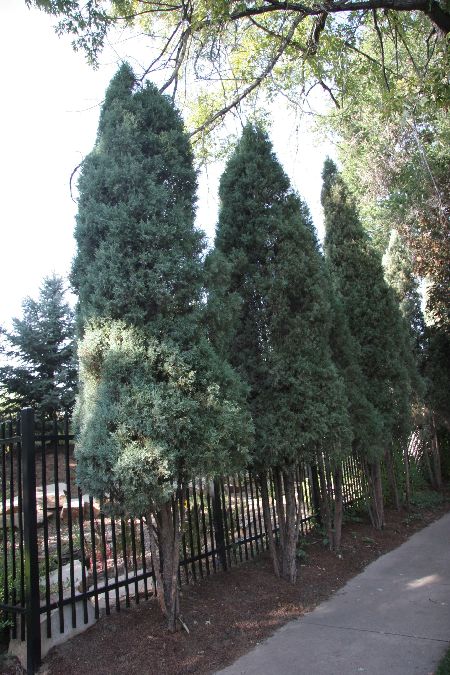
Juniperus scopulorum
Rocky Mountain Juniper
Many different selections of Rocky Mountain Juniper are available, with variable forms, textures and foliage color. Look for 'Skyrocket', blue-green foliage; 'Gray Gleam', blue-gray foliage, 'Blue Haven', deep blue-gray foliage; and 'Tolleson's Blue Weeping', drooping form with blue-gray leaves. Canopy coverage: 314 square feet.
[Read More]
Justicia brandegeana
Shrimp Plant
Shrimp Plant gets its name from the shrimplike bracts, modified leaves, that surround the white summer flowers. Plants evoke a subtropical mood, but are rather hardy to cold. However, it is best with some protection from the sun in hot summer regions. Canopy coverage: 7 square feet.
[Read More]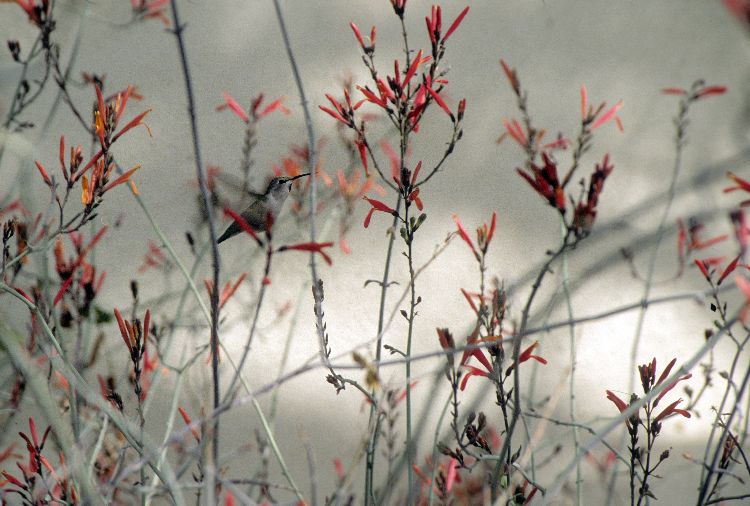
Justicia californica
Chuparosa
Chuparosa may be semievergreen in colder climates. Brightly colored flowers are appreciated as winter turns to spring. Canopy coverage: 28 square feet.
[Read More]Justicia spicigera
Mexican Honeysuckle
Accepts morning sun in hot-summer areas but best with filtered sun such as beneath canopy trees. Large, soft leaves evoke a subtropical effect. Canopy coverage: 13 square feet.
[Read More]Keckiella antirrhinoides
Yellow Bush Snapdragon, Yellow Bush Penstemon
An arching, evergreen shrub that goes drought deciduous (drops leaves) during dry summers. Plant in well draining soil; water only occasionally in summer. Flowers are large, to 4 inches long, fragrant, and attract many forms of wildlife. Canopy coverage: 7 square feet.
[Read More]Lagerstroemia indica
Crape Myrtle
Crape Myrtle can be successfully grown as a tree or shrub. It offers interest all year—flowers summer into to fall, fall color, and interesting sculptural branches during winter after leaves fall. Canopy coverage: 314 square feet.
[Read More]Larrea tridentata
Creosote Bush
Creosote Bush is truly a shrub that speaks of the desert. It emits that unique desert sense of place scent after a rain. Use as a character plant for the toughest conditions. Highly drought tolerant but better appearance with occasional summer irrigations. Canopy coverage: 79 square feet.
[Read More]